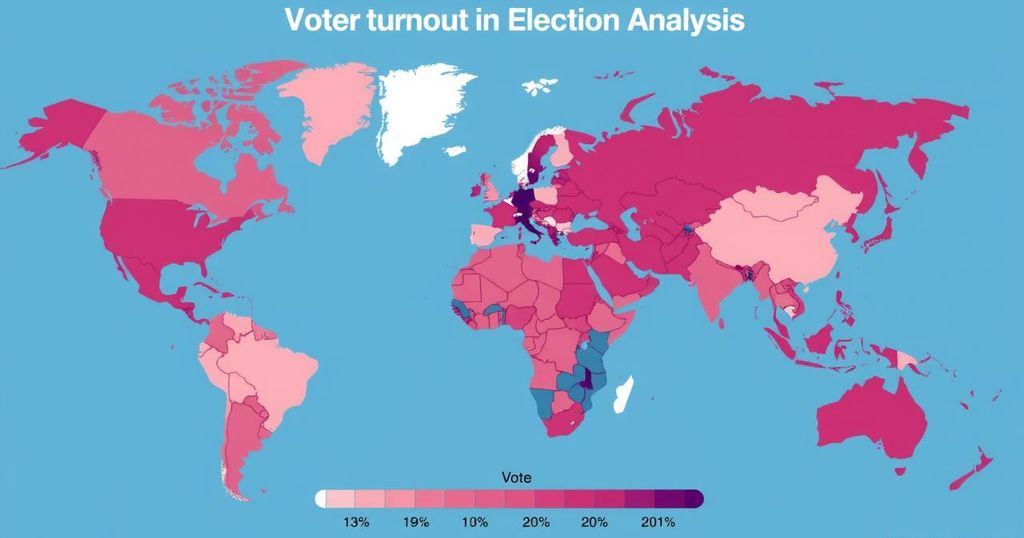2024 Elections: A Global Reflection on Democracy and Voter Sentiment
The year 2024 saw unprecedented participation in democratic elections worldwide, showcasing nearly half of the global population voting to select leaders. However, results indicated a preference for immediate self-interest over collective needs, largely driven by economic anxieties. Significant political changes occurred in numerous countries, with incumbents facing losses due to growing disenchantment with traditional parties, emphasizing the complexities and interconnectedness of global democracies.
The year 2024 marked a monumental period for democracy, as nearly half of the global population in over 60 nations participated in elections to choose their leaders. Despite this unprecedented electoral engagement, the outcomes revealed a troubling tendency among voters, who often prioritized immediate self-interest over collective well-being. Issues such as climate change were largely overshadowed by pressing economic concerns that drove decisions in industrialized nations, which influenced electoral results throughout the year.
In the United Kingdom, economic woes enabled Keir Starmer’s Labour Party to secure a significant victory against the Conservatives after years in opposition. In the United States, incumbent President Joe Biden faced backlash not only due to inflation but also stagnant wages, leading many voters to support Donald Trump as a call for change. The pattern of voting based on economic pressures repeated itself across various democracies, as incumbents in multiple countries were dismissed in light of the electorate’s dissatisfaction.
Prominent elections included Donald Trump’s resurgence in the U.S. and setbacks for leaders like Indian Prime Minister Narendra Modi and French President Emmanuel Macron, both criticized for perceived failings in managing economic challenges exacerbated by external factors such as the pandemic and the conflict in Ukraine. In South Africa, the ruling party lost a majority for the first time, emphasizing a broader rejection of traditional political establishments in favor of populist alternatives.
As 2024 drew to a close, the implications of these elections became evident, with countries like Germany facing snap elections due to political instability. Notably, Russia’s electoral proceedings under Vladimir Putin raised concerns regarding the genuine nature of democracy, revealing stark contrasts against the backdrop of the democratic endeavors witnessed globally.
The unfolding political landscape demonstrates a significant and crucial lesson: the interconnectedness of nations and the ripple effects of electoral choices across borders. In a world where decisions by powerful nations have global ramifications, the evolution of democracy must be preserved and nurtured, as it holds the key to addressing both domestic and international challenges. The hope persists that the recent surge in democratic participation will reinforce the fundamental values that underpin the very essence of democratic governance, particularly as it pertains to humanitarian issues like climate change and international stability.
The 2024 elections represented an extraordinary involvement in democracy, as nearly half of the world’s population engaged in voting processes across numerous countries. This period highlighted the complexities and challenges of contemporary governance, wherein voters often prioritized immediate economic interests over longer-term societal needs, such as climate action. The political landscape shifted significantly, with many incumbents facing defeats as societal anxieties over economic stability and personal welfare overshadowed traditional party loyalty. The results in various countries reflected not only national concerns but also underscored the global implications of individual electoral choices, especially concerning international relations and democracy at large.
In conclusion, the remarkable engagement in the 2024 elections across the globe showcased both the promise and challenges of modern democracy. Voters’ inclination towards immediate self-interest, driven by economic concerns, resulted in significant political upheaval in numerous nations. These trends highlight the need for sustained commitment to democratic principles while addressing pressing global issues, such as climate change and political stability. As the world moves forward, it is imperative to recognize the interconnectedness of democracy and the collective responsibility in furthering global democratic norms for a more hopeful future.
Original Source: edition.cnn.com




Post Comment